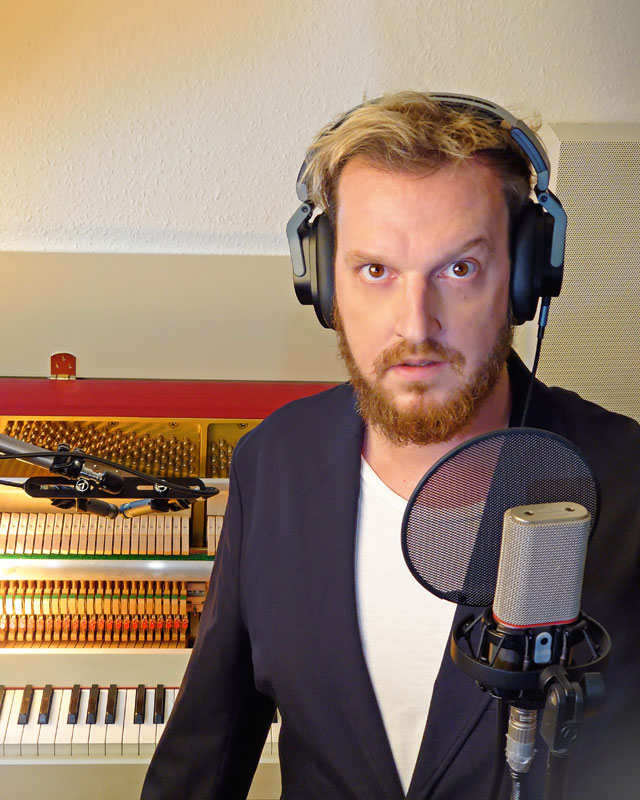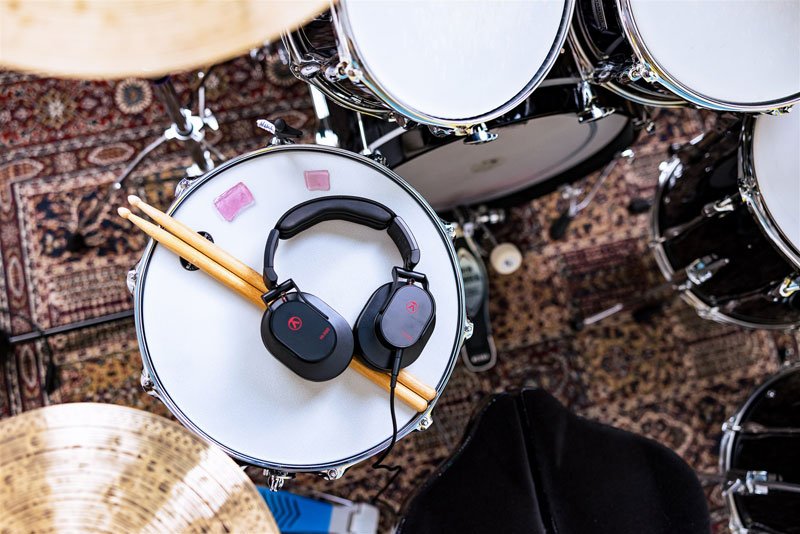The event industry has been in a state of flux ever since the Corona pandemic. Artists and producers are using the possibilities that digitalization brings to create new, creative and breathtaking shows, music and performances. Ron Flieger is one of those creative minds that are constantly and always on the lookout for new innovations. Originally discovered as a singer/songwriter by Warner Music, he quickly found his passion in the creation of soundscapes – or “music production”. He is now an experienced producer for studios such as Warner Music and Universal Music, remixer and audiovisual artist NFT. On April 26th Ron Flieger will be present as a guest at the press reception of Austrian Audio in hall 11, booth C16. In the run-up to the event, the producer talked in an interview about his daily work, the future of music and his expectations for the industry.
1. As Creative Director and Digital Strategist, you have a lot to do with different artists, companies and characters. What is the charm of your work?

Ron Flieger
What is charming indeed is, that not even two days are ever the same and that you can continue to develop and, in the best case scenario, even reinvent yourself. Digitalization in particular brings with it rapid changes, which you have to face partly with a gut feeling and partly with experience. That’s exciting per se, and I love this challenge.
2. Your passions are creations of sound landscapes: where do you get your inspirations and ideas from?
I try to stay in constant motion, that is, mentally never to stay too long in one and the same place. Now I don’t necessarily mean that geographically, but also metaphorically. It helps immensely to change the point of view more often. Of course, the enormous technological advances of the last few years have been a great help.
3. What role do technology and technological developments play in your daily work?
I enjoy immensely that I am no longer tied to a huge machine to successfully realize audiovisual ideas. Of course, I still love analog equipment, but plugins, cell phones, etc. have become so excellent that the essence of an idea can be realized more spontaneously and genuinely than ever before. In music production I have been completely digital for years, that is In The Box as they say, however – and this is a big however – analog, real instruments are still a strong base of my work. When an idea comes and I can sit down at a real piano, which by the way is permanently miked for this very reason, then the creative work can simply flow.
4. What role do quality products like Austrian Audio’s play in music production?
 Austrian Audio products have a very big place in my workflow. The headphones are amazing and really capture reality with a natural stereo image and frequency response. I use both the Hi-X65 (open back) and the Hi-X60 (closed), so this gives me a slightly different sound image when needed. I still have studio speakers with an extra subwoofer in my Creative Crib, but I like to work a lot on the Austrian Audio headphones. The mics (CC8 and OC818) are in constant use with me and partly even permanently installed.
Austrian Audio products have a very big place in my workflow. The headphones are amazing and really capture reality with a natural stereo image and frequency response. I use both the Hi-X65 (open back) and the Hi-X60 (closed), so this gives me a slightly different sound image when needed. I still have studio speakers with an extra subwoofer in my Creative Crib, but I like to work a lot on the Austrian Audio headphones. The mics (CC8 and OC818) are in constant use with me and partly even permanently installed.
5. What distinguishes the products of Austrian Audio?
Austrian Audio products are absolute workhorses: super reliable, super processed and with a top noise floor. I can really do anything with recorded signals in the computer later. I really like the fact that, for example, the microphones don’t already have a too extreme color during recording. The OC818 is really an extremely good vocal microphone for my voice, among other things.
6. The event and music industry has been very shaken in the past two years. How have you felt about that time?
My team and I have actually done very well through the last two years because we are very diversified. My main business is creative direction, and I almost always take care of the audio-visual implementation, that is, the whole package. On top of that, even before Corona, I was already completely digitally set up, so our challenge was more in homeschooling, for example. I also really missed traveling, so it’s great that we’re doing more of that again in 2022.
7. What expectations do you have for the development of the industry in the future – and for a future after Covid?
I would like to see a fairer monetary distribution, especially in the streaming sector. Basically, you can already state, that the question arises as to what we would be without all the creative people who make all the great musical works possible in the first place and who decide, that they don’t necessarily want to be in the public eye. If you could successfully turn that set screw, I’m sure it would make a big tangible difference to the industry as a whole. You could certainly fill a few pages on this question, but I’ll stick to this point for now.
8. How do you think the reception of music in general and of live music has changed with Covid?
The trend towards streaming tracks instead of streaming albums was certainly already there before Covid. However, I feel that this trend has been strengthened by Covid. Only artists of the stature of Adele, who managed to disable shuffle mode as a default setting on Spotify for her current album release, can still counteract this. Music is also increasingly being consumed via social media, increasingly TikTok. TikTok has experienced enormous hype as a result of the pandemic. Here, the 20-30 seconds of a song are decisive for success, not so much the dramaturgy over e.g. 3 minutes. Experimental breakouts from known song structures are more rarely the case and also desired. In 2022, a track on Spotify, for example, will not be monetized until it has been listened to for 30 seconds straight. A 2022 study by Samsung says that attention spans have dropped to 8 seconds since 2000, meaning pop songs are likely to get shorter and shorter, and the first few seconds of a song are crucial. This of course has an inevitable impact on live music. In my opinion, individual tracks are even more in the focus of the audience than it was already the case before the pandemic.
9. You will be attending Prolight + Sound 2022 as part of a Press Reception. Do you also have time to look around at the trade fair? And if so, what are your expectations for the show?
I certainly hope so. 🙂 There are already a few, more dates lined up that I’m really looking forward to, so I guess this will work out! I really hope to find some new inspiration for my workflow here and there, because a rolling stone gathers no moss and innovation is the key!
Music producer Ron Flieger at the Austrian Audio press reception
When? 04/26/2022 / 16:30 o’clock
Where? Austrian Audio booth, hall 11, booth C16
Pictures: Austrian Audio






